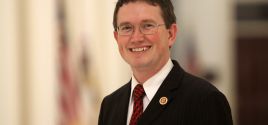Parents wary of swine flu vaccineBy Jackie AlexanderOcala.com Oct. 27, 2009 |
Popular 
Rep. Thomas Massie Warns Congress is Trying to Pass Hate Speech Laws to Outlaw Criticism of Israel

ADL Urged Congress to Pass FISA Law Spying on Americans to 'Protect Israel'

'Sniper Seen on Roof Overlooking Pro-Palestine Protest' at Indiana University

Claim Jewish Student Was 'Stabbed In The Eye' by Pro-Palestine Protester Draws Mockery After Video Released

Axios Poll: Majority of Americans Now Want Mass Deportations
 Al Garfield and his son will not be in line today for the H1N1 vaccine. Or any other day, for that matter. Garfield says he, like many other parents, is wary of the vaccine's safety and isn't convinced it's needed. "They [the government] are playing Russian roulette" with the vaccine, he said. According to an Associated Press poll, about 52 percent of Americans will get the vaccine, leaving half the nation not seeking the shot. More than 70 percent of parents are worried about the vaccine's side effects on their children. Garfield said he spent a lot of time researching at the Centers for Disease Control and Prevention's Web site and other alternative Web sites before coming to his decision. "It seems the Internet is crawling with that stuff," he said. "If only 10 percent of it were true, we're in deep trouble." The CDC's Dr. Anne Schuchat said in a news briefing earlier this month that the vaccine's side effects are rare. "We are not cutting any corners in the safety in the production of the vaccine," she said. "It is very important to us that this process is done carefully and safely." No one should be forced to put poison in their body, Garfield said. Thimerosal, a mercury-based preservative, is used in the H1N1 vaccine. "This is an old technology that should have been thrown out long ago," he said. "Our bodies are capable of overcoming all these diseases." Garfield has an autistic son. He said he briefly considered removing his son from school, but after hearing the vaccines wouldn't be provided during the school day, he reconsidered. According to the CDC, thimerosal is harmless based on reviewing past studies. What's dangerous, Garfield said, is trusting in the monopoly of big pharmaceutical companies, protected by law. The Public Readiness and Emergency Preparedness Act of 2005 provides immunity from tort liability for drugs used under an emergency use authorization during a national public health emergency. On June 15, 2009, Secretary of Health and Human Services Kathleen Sebelius added H1N1 to the list, according to her agency's Web site. That's what people should be afraid of, said Toni Krehel, president of K.N.O.W. Vaccines. "If this vaccine is so safe, why is it necessary to protect the manufacturers, but not the users," she said. "What we need is a public health system based on trust, not compulsion." Jacksonville-based K.N.O.W. Vaccines is the Florida affiliate of the National Vaccine Information Center. "Just because we have concerns about vaccine safety and vaccine policy doesn't make us anti-vaccine," Krehel said. "There needs to be honesty, there needs to be discussion, and at a minimum, people and their civil rights and religious rights need to be protected," she said. In New York, Dr. Richard Daines, the state health commissioner, made it mandatory for all state health workers to get vaccinated against H1N1. Courts later filed an injunction against the order. "No one ever should be forced to take something, especially something that has known risk for death or injury, without informed consent," Krehel said. "There's no reason to make criminals out of people who don't want it." Currently, more than 16 million doses of the vaccine are available, according to the CDC. Krehel said being concerned about injecting foreign proteins and toxins into the bloodstream is not irrational. "We're not dumb people. We're not anti-vaccine," she said. "We just want to protect our rights, and that's what it's all about." |



